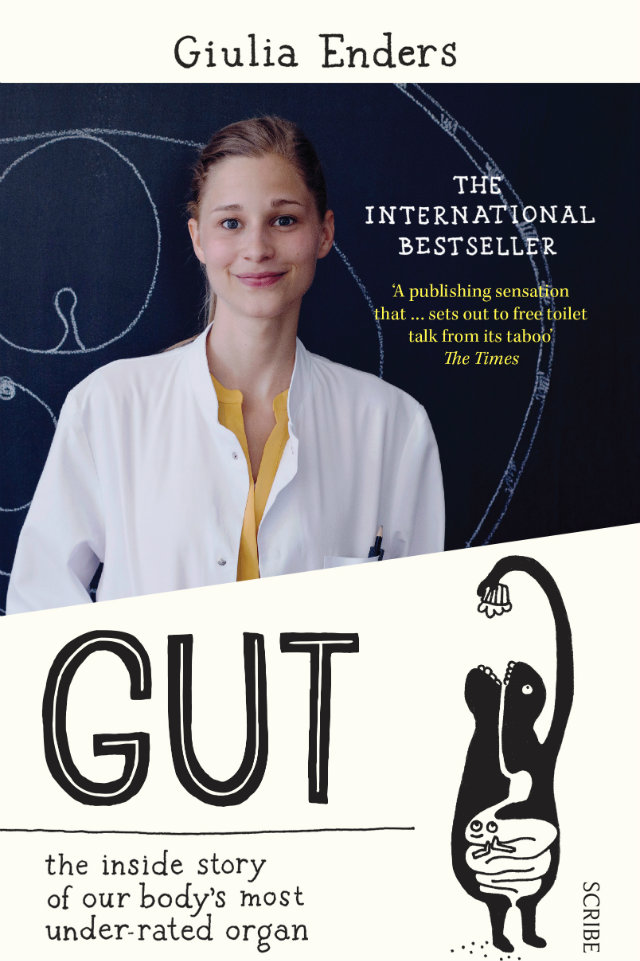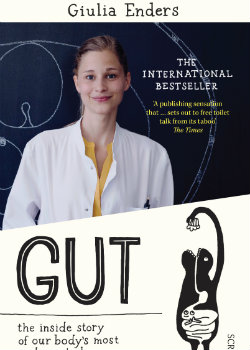
Gut The Inside Story of Our Body's Most Underrated Organ
The Inside Story of Our Body’s Most Underrated Organ.
How do you sit on a toilet?
Weird question, huh? It’s one you might hear a toddler ask as they’re being potty-trained, but never one you would expect an adult to pose. It’s especially not the kind of question you’d expect to hear from Giulia Enders, an esteemed microbiologist pursuing a doctorate at Frankfurt, Germany’s Institute for Microbiology.
But don’t fret; Giulia’s book Gut has more to offer than potty-language and a sense of humor. Her book is an informative read, and it’s an international best seller.
Ms. Enders owes her fascination with the subject to personal experiences that also inspired her medical studies. When, as a teenager, she developed a sore on her leg that started to spread, doctors were mystified. She had read something about how how antibiotics caused health problems and, after putting the pieces together, Ms. Enders suspected her intestines might be the problem. It was then when she decided to radically change her diet; as soon as she eliminated dairy and gluten, her health improved.
After first describing the functions of organs in the digestive process, Enders explains the significance of how bacteria interacts with our body and immune system, and hence why things go wrong.
In her new book, Gut, she simplifies the latest scientific research on the digestive system, explaining the importance of health changes such as these to her eagerly listening audience. After first describing the functions of organs in the digestive process, Enders explains the significance of how bacteria interacts with our body and immune system, and hence why things go wrong. She probes the causes of obesity, acid reflux, glucose, lactose and gluten intolerances, diabetes, and coeliac disease.
We “inherit” bacteria and a health blueprint (aka propensities for disease) from our mothers, but both the birth environment, i.e. the germs we’re exposed to, and the “flora” we inherit from our culture, affect how we later process food and what diseases we’re likely to develop.
Our gut possesses a complex and autonomous nervous system considered by some scientists to rival the brain’s. It’s responsible in no small measure for how we feel.
Gut raises many interesting points, answering questions like:
• Why having a “gut” feeling is not mere figure of speech; our gut possesses a complex and autonomous nervous system considered by some scientists to rival the brain’s. It’s responsible in no small measure for how we feel;
• Why breastfeeding a child can improve immunity and lower the risk of obesity by promoting production of positive bacteria;
• How specific bacteria in the gut link to anxiety, depression, and even schizophrenia
In support of the saying, “You are what you eat,” the book offers many useful tips, too:
• Eating olive oil can protect you against arteriosclerosis, Alzheimer’s, eye disease, arthritis, and cancer;
• Organic eggs from homegrown grain-fed chickens can help you avoid dangerous bacteria;
• Foods like yogurt and miso are so good for you.
It’s hard not to be awed by Enders’ vast knowledge of anatomy and microbiology and share her fascination with the 100 trillion tiny creatures in our tummies.
It’s also hard not to agree with some of her key points; in books like Ender’s…. the mysteries of our digestive system have been underrated and do deserve a closer look.






